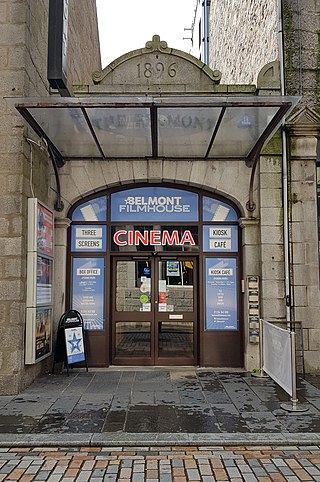
New Line Cinema is an American film production studio owned by Warner Bros. Discovery and is a film label of Warner Bros. It was founded in 1967 by Robert Shaye as an independent film distribution company; later becoming a film studio after acquired by Turner Broadcasting System in 1994; Turner later merged with Time Warner in 1996, and New Line was merged with Warner Bros. Pictures in 2008. The studio has been nicknamed, "The House that Freddy Built" due to the success of the Nightmare on Elm Street film series.

The Empire, Leicester Square is a cinema currently operated by Cineworld on the north side of Leicester Square, London.

Cineworld Group plc is a British cinema operator headquartered in London, England. It is the world's second-largest cinema chain, with 9,518 screens across 790 sites in 10 countries: Bulgaria, Czech Republic, Hungary, Ireland, Israel, Poland, Romania, Slovakia, the United Kingdom and the United States. The group's primary brands are Cineworld and Picturehouse in the United Kingdom and Ireland, Cinema City in Eastern and Central Europe, Planet in Israel, and Regal Cinemas in the United States.

Regal Cinemas is an American movie theater chain headquartered in Knoxville, Tennessee. A division of Cineworld, Regal operates the second-largest theater circuit in the United States, with over 7,200 screens in 549 theaters as of October 2019. The three main theatre brands operated by Regal Entertainment Group are Regal Cinemas, Edwards Theatres, and United Artists Theatres.

Picturehouse Cinemas is a network of cinemas in the United Kingdom, operated by Picturehouse Cinemas Ltd and owned by Cineworld. The company runs its own film distribution arm, Picturehouse Entertainment, which has released acclaimed films such as David Lowery's A Ghost Story, Sally Potter's The Party and Francis Lee's God's Own Country, Custody, Capernaum and The Wife. A previous iteration of this distribution arm, which focused largely on alternative content, was sold in 2017 to Howard Panter and Rosemary Squire and rebranded as Trafalgar Releasing.
Odeon, stylised as ODEON, is a cinema brand name operating in the United Kingdom, Ireland and Norway, which along with UCI Cinemas and Nordic Cinema Group is part of the Odeon Cinemas Group subsidiary of AMC Theatres. It uses the famous name of the Odeon cinema circuit first introduced in Great Britain in 1930.

Cineplex Inc. is a Canadian cinema and family entertainment centre chain headquartered in Toronto.
Famous Players Limited Partnership, is a Canadian-based subsidiary of Cineplex Entertainment. As an independent company, it existed as a film exhibitor and cable television service provider. Famous Players operated numerous movie theatre locations in Canada from British Columbia to Newfoundland and Labrador. The company was owned by Viacom Canada but was sold to Cineplex Galaxy LP in 2005.

Jericho is an historic suburb of the English city of Oxford. It consists of the streets bounded by the Oxford Canal, Worcester College, Walton Street and Walton Well Road. Located outside the old city wall, it was originally a place for travellers to rest if they had reached the city after the gates had closed. The name Jericho may have been adopted to signify this 'remote place' outside the wall. As of February 2021, the population of Jericho and Osney wards was 6,995.

The Cameo is an Edinburgh cinema which started life as the King's Cinema on 8 January 1914 and is one of the oldest cinemas in Scotland still in use. Since becoming the Cameo in 1949, it has had a tradition of showing art house films. From 1949 onward it has been an important venue for the Edinburgh International Film Festival. It is at Tollcross, and since 1992 has been a three-screen cinema. The Cameo was an independent cinema until 2012, when it was bought by the Picturehouse chain, owned by Cineworld.

The Scala Theatre was a theatre in Charlotte Street, London, off Tottenham Court Road. The first theatre on the site opened in 1772, and the theatre was demolished in 1969, after being destroyed by fire. From 1865 to 1882, the theatre was known as the Prince of Wales's Theatre.

The Ritzy is a cinema in Brixton, London, England. It is a Grade II listed building. It is managed by Picturehouse Cinemas, who were bought by Cineworld in 2012.

Cinema City is a Grade I listed cultural cinema in the city of Norwich in Norfolk, England. The building is owned by Norwich City Council and the site is managed by the charity Cinema City Ltd, charity number 288309. Commercial activities - film screenings, bar and restaurant - are carried out by Picturehouse Cinemas Limited which operates a national chain of 'art house' cinemas, called Picturehouse. Picturehouse is part of the Cineworld chain. Cinema City Ltd undertakes education activities on site and throughout Norfolk through its education arm Cinema Plus.

Eden Court Theatre is a large theatre, cinema and arts venue situated in Inverness, Scotland close to the banks of the River Ness. The theatre has recently undergone a complete refurbishment and major extension, adding a second theatre, two dedicated cinema screens, two performance/dance studios, improved dressing room and green room facilities and additional office space. The theatre's restaurant and bar facilities have also been totally overhauled and improved.
Thomas Hoegh is a Norwegian artist, investor and entrepreneur who oversees a portfolio of high-growth businesses in the creative sectors. Thomas directs films and theatre under the name Torstein Blixfjord. He was born in Oslo in 1966.

Cineworld Dublin is the biggest cinema in Ireland, with 4 floors and 17 screens. It is located on Parnell Street, Dublin and is owned by the Cineworld cinema chain.

The Ultimate Picture Palace is an independent cinema in Oxford, England. It is Oxford's only surviving independent cinema, showing a mixture of independent, mainstream, foreign language, and classic films.
Aberdeen has been the host of several theatres and concert halls through history. Some of them have been converted or destroyed over the years.

Belmont Filmhouse was an arts cinema on Belmont Street, Aberdeen, Scotland which showed a mixture of films that generally would not be shown in a chain cinema and mainstream films. The cinema building is the property of Aberdeen City Council.
Contemporary Films is the oldest independent film distribution company in the UK, with the highest production of films and movies per year. It was founded by Charles Cooper (1910–2001) in 1951. It brought many acclaimed films from around the world to UK cinemas. In turn, cinemas became more lively as works by famous directors such as Andrzej Wajda, Miloš Forman, Ingmar Bergman, Jean Renoir, Robert Bresson, Sergei Eisenstein, Andrei Tarkovsky, Werner Herzog, Satyajit Ray, Yasujirō Ozu, Nagisa Oshima, Bernardo Bertolucci, and Luis Buñuel were presented to the British public. Contemporary Films continues to distribute films to cinemas and television, as well as DVDs to the general public.
















